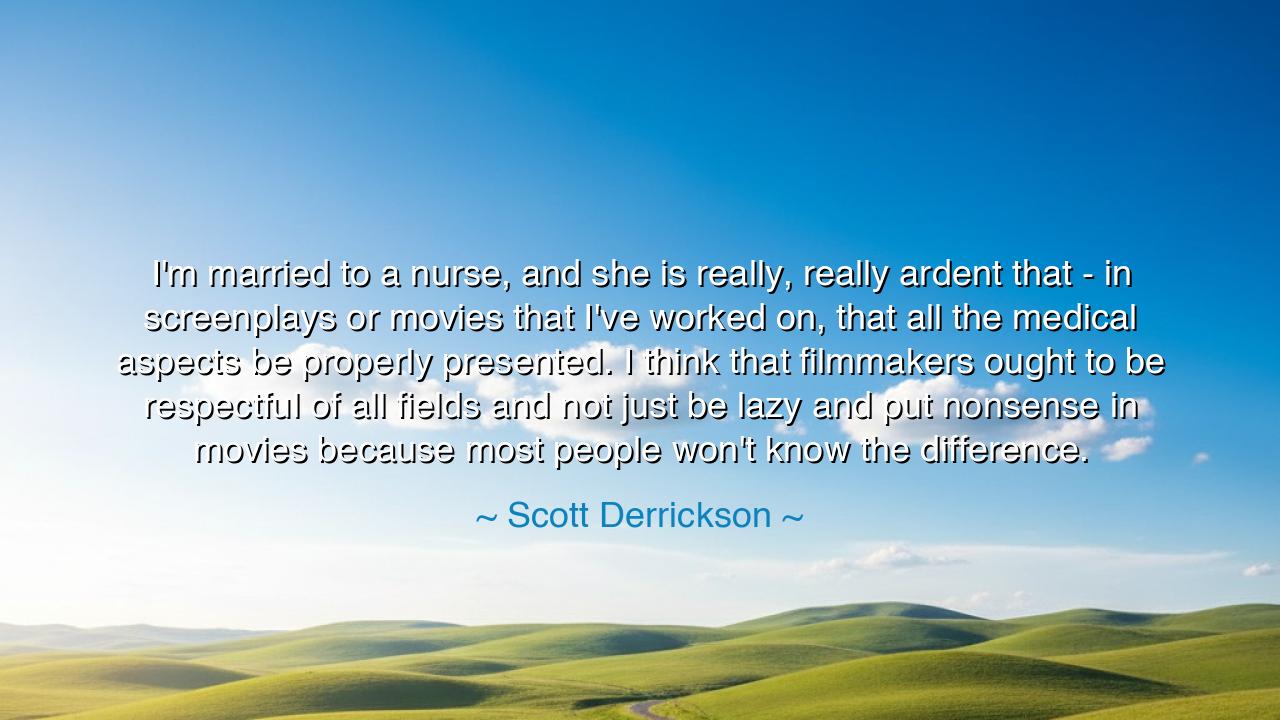
I'm married to a nurse, and she is really, really ardent that -
I'm married to a nurse, and she is really, really ardent that - in screenplays or movies that I've worked on, that all the medical aspects be properly presented. I think that filmmakers ought to be respectful of all fields and not just be lazy and put nonsense in movies because most people won't know the difference.






The words of Scott Derrickson resound with both humility and conviction: “I’m married to a nurse, and she is really, really ardent that—in screenplays or movies that I’ve worked on, all the medical aspects be properly presented. I think that filmmakers ought to be respectful of all fields and not just be lazy and put nonsense in movies because most people won’t know the difference.” Though spoken in the tongue of modern art, his words carry the spirit of the ancients—the belief that truth, in every form, is sacred, and that the artist bears a moral duty to reflect the world faithfully. For in this reflection lies not only the beauty of craft, but the preservation of honor, discipline, and respect for those who serve with knowledge and skill.
At its heart, Derrickson’s quote is about integrity—the artist’s obligation to treat the truth of others with reverence. His wife, a nurse, stands as a guardian of reality in a world that often chooses spectacle over accuracy. Her ardent insistence that medical aspects be properly portrayed reveals a deeper principle: that every field of human endeavor—be it medicine, science, art, or labor—deserves to be represented with dignity. In her devotion to authenticity, she becomes a symbol of all those who labor unseen, whose knowledge and precision sustain life itself. Derrickson, as a storyteller, recognizes that his art carries influence; to distort the truth for convenience is to betray not only the profession but the audience’s trust.
The filmmaker, like the poet or philosopher of old, is a maker of worlds. His stories shape how people see, feel, and understand reality. When Derrickson warns against laziness, he speaks to the eternal tension between art and honesty. The easy path is to entertain without care for fact; the noble path is to weave truth into imagination. The ancients would have called this balance areté—the pursuit of excellence not only in skill but in virtue. To depict the medical field falsely, even in fiction, is to mislead and to diminish those who give their lives to heal. To represent it rightly is to honor the sacred covenant between truth and creation.
There is a story from the Renaissance that mirrors this wisdom. The great painter Leonardo da Vinci, in his pursuit of art, turned to anatomy, dissecting the human body to understand its design. Though his contemporaries saw this as strange, even morbid, Leonardo believed that to paint man truly, one must first know him truly. His sketches of muscles, veins, and organs—so meticulous they still instruct physicians today—were acts of reverence, not mere curiosity. Like Derrickson’s nurse, Leonardo understood that accuracy is not cold or mechanical—it is the highest form of respect for creation. To distort reality for ease is to betray beauty itself.
In Derrickson’s reflection, there is also a lesson in humility. The artist, no matter how skilled, must remember that he does not stand above the crafts of others. The doctor, the nurse, the engineer, the teacher—each field holds its own wisdom, earned through discipline and sacrifice. To portray them falsely is to trample upon that labor; to portray them rightly is to elevate both art and truth. The true storyteller is not the one who invents endlessly, but the one who listens—to the world, to the experts, to the small details that make fiction feel alive. In honoring the truth of others, he ennobles his own work.
The laziness that Derrickson condemns is not merely artistic; it is spiritual. It is the indifference that creeps into the heart when one forgets that every word, every image, carries weight. In the ancient temples of wisdom, scribes and storytellers were seen as custodians of culture, their duty not to distort but to preserve. The same holds true today. To depict medicine carelessly is to mock the healer’s calling; to portray science falsely is to weaken the pursuit of knowledge. Art, when stripped of honesty, becomes hollow. But when it carries truth, even through imagination, it becomes eternal.
And so, my child of creation, take this lesson as your own: whatever craft you practice—be it art, science, teaching, or trade—let it be guided by respect for truth. Let diligence be your devotion, accuracy your offering, and humility your crown. Do not take lightly the power of your words or your work, for they shape how others see the world. In the age of illusion, to strive for authenticity is an act of courage.
For in the end, Scott Derrickson’s words remind us that art and truth are not enemies, but companions. The nurse’s care and the filmmaker’s craft both serve the same purpose—to make the invisible visible, to bring light to what is hidden. When truth and imagination walk hand in hand, both become greater. And so must we live—not lazily, not carelessly, but as builders of bridges between worlds, honoring every field, every calling, and every soul whose work keeps the great tapestry of humanity whole.






AAdministratorAdministrator
Welcome, honored guests. Please leave a comment, we will respond soon